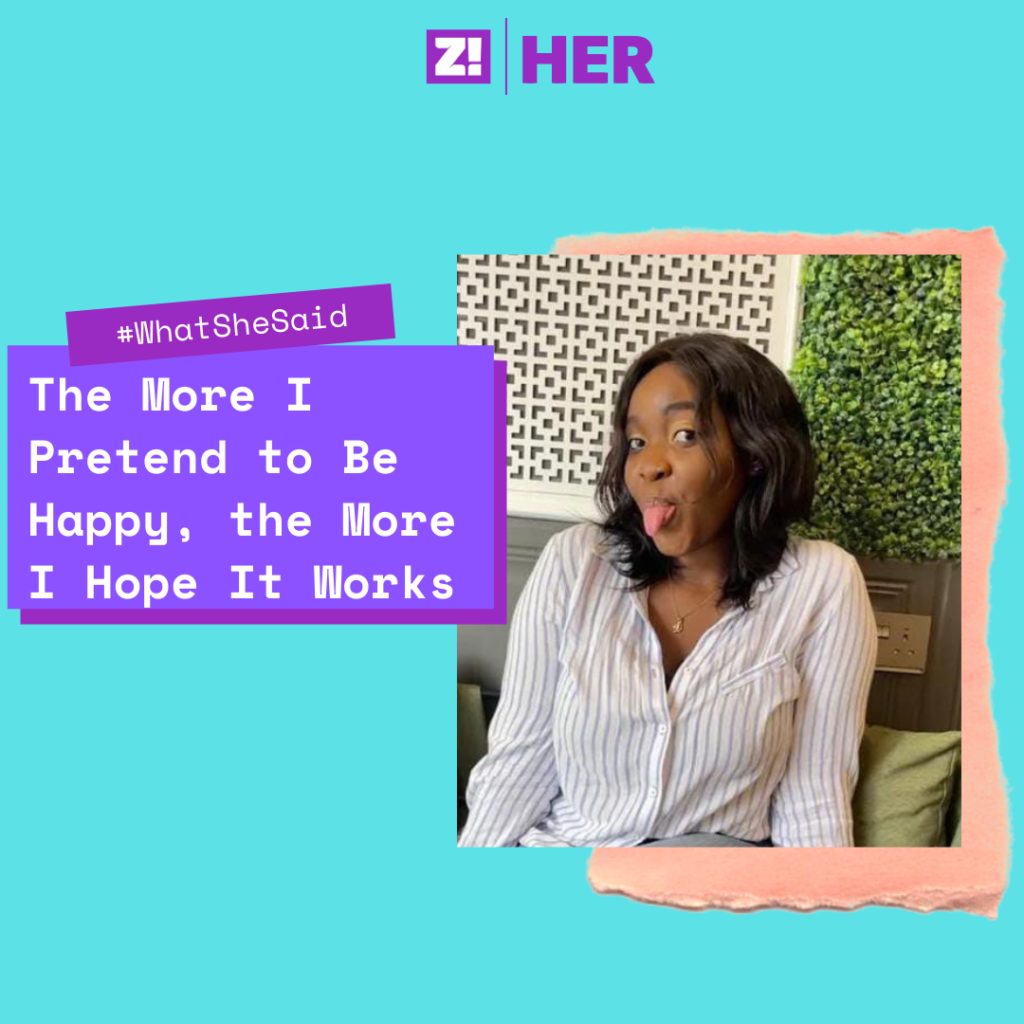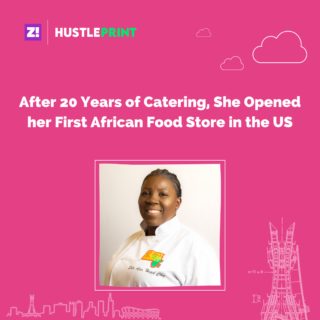Navigating life as a woman in the world today is interesting. From Nigeria to Timbuktu, it’ll amaze you how similar all our experiences are. Every Wednesday, women the world over will share their experiences on everything from sex to politics right here. This is Zikoko’s What She Said.

Today’s #ZikokoWhatSheSaid subject is Laura, a 23-year-old Kenyan woman. She talks about moving to a new town at 16, her rocky relationship with her sister, respecting her more after their mum dies, struggling with depression and finally accepting that grief is an unending cycle.
What was it like growing up in Kenya?
I lived in a city called Kisumu and it felt very communal. People were so close that neighbours ate dinner at each other’s houses. I loved it. When I was 16, we moved to Nairobi, and it was a huge culture shock.
In Nairobi, people are a lot more individualistic. Everyone minds their business, and I found it strange at the time. In Kisumu, everyone knew everyone. The downside was having aunties report me to my mum or sisters whenever I did anything mischievous. Still, it felt more like home.
LOL. The reporting part has Nigerian aunties written all over it.
LOL. Kenyan aunties win the war there.
But if you loved Kisumu so much, why’d you leave?
I lost my mum. I was 16, and there was no one to take care of me while my siblings were away at school or work. I ended up in Nairobi with my older sister. She worked as a banker, so I moved into her one-bedroom flat with my immediate older sister. Without our mum, it was a different kind of experience living together.
I’m really sorry about your mum. Tell me about your experience with your sisters?
Thanks. In the first few months, we’d butt heads a lot. Imagine three people living with three sisters in one room. I remember one evening, my sister’s boyfriend came to the house. The house was already tight enough as it was, so I had to sleep on the floor. I was frustrated and didn’t know when I yelled, “I wish my mum were here. I wouldn’t be sleeping here.”
Everyone was grieving in their own way. I’d say the loss made us closer though. When we were younger, the disagreements were a lot worse. We never saw eye to eye. They felt my mum overindulged and spoiled me. So we never got along, ever. I grew up knowing my sisters hated me. And it was mutual.
Oh wow.
Yeah. Normal sisters stuff. I thought they could’ve been more supportive, especially my eldest sister. But moving in with her made me respect her more. She was 25 and suddenly responsible for two people. Her taking care of us financially made our relationship better. We talked more.
Without my mum, I started to see some of the toxic traits my sisters pointed out as kids. Like how I changed primary schools five times for no good reason. One time, I moved because I thought the school had cooler kids than I. Or the expensive toys and clothes mum bought for me. I’d either spoil or misplace them in one or two weeks, but she’d replace everything without question. They never understood why she allowed me to get away with everything.
Did you?
Sort of. My mum was the last child too. She always said she saw herself in me. Although I never met my dad, he was also the last born. I’d imagine they were two equally troublesome people who came together to have me. So think of me as the problem child. I was the one changing schools, getting toys or getting into arguments with other kids in my neighbourhood.
We were really close, but she wasn’t always home. She’d either be at the office or travelling for work. I still tell my sisters I had more memories of our mum’s eldest sister. She was so consistent in my life that people at school thought she was my mum.
So you were closer to your aunt?
I felt like she understood me. Maybe it was how she made sure my siblings didn’t get a chance to beat me when my mum was away. She was the aunty everyone in the family was afraid of. But for some reason, we connected.
When my mum passed, people at school assumed it was my aunt that died. That’s how close we were.
How did your mum’s absence make you feel?
Ignored. Especially now that I think about it as an adult. I didn’t need the toys she bought as much as I needed her. I saw other kids with their dads and mums picking them up from school. I wanted that too. But I didn’t resent her though. When she was around, we bonded. My resentment was towards how she died and how early it happened.
In 2013, she’d been demoted from work and got really sick. We went from never seeing her catch even a cold to suddenly being in and out of the hospital for the next two years. She got better in 2015 and started a new job. But by October, she started getting sick again and that was it.
Do you know exactly what was wrong?
We never got a specific diagnosis. I still don’t think her death had anything to do with an illness. Sometimes, we’d go to the hospital and doctors wouldn’t find anything wrong. I’d say she was depressed and that manifested into some kind of physical pain. After the demotion, she never got back to that rank and stopped making as much money. Things got worse once she began to fall sick.
To me, that job was a distraction from losing a husband at 34 and raising three kids alone. So when my mum lost it, all that sadness came back till eventually, she gave up on fighting. I’ve never said that out loud before.
I loved… love her. I only wish we had more time together.
Thank you for opening up to me. How did you cope with the loss?
I had my sisters. Until I went to uni in 2017, everything seemed fine. At school, the goal was to drown all the emotions about my mum’s death.
I made two new friends and focused on hanging out with them. We’d go on tiny dates to ames (tuck shops), walk around the campus together — I was on a vibe. If I wasn’t with them, then I had my boyfriend. I did everything to ignore reality, and hanging out with my friends made me feel better. The distraction worked until we had a class on the five stages of grief. That was the downside of studying psychology. Sometimes, it made me feel understood. Other times, it forced me to confront things I didn’t want to.
Why did you choose to study psychology then?
My mum was a psychologist and always wanted one of us to take after her. I started off wanting something more creative, like journalism, but when I took some psychology classes before college, I fell in love with it. I didn’t think I’d be the sister following in our mum’s footsteps, but here I am. I had always loved understanding people’s thought processes, particularly the way they affected women.
As a kid, I wondered why I was stuck in the kitchen during festive seasons, while the men got to mingle outside. I guess that made me curious about the human behaviours that introduced certain beliefs. And psychology gave me some knowledge on that.
Becoming a feminist didn’t fully kick in until I joined Twitter in 2019. When I was in high school, I’d seen Kenyan women like Sheaffer Okore on TV talking about our rights, but Twitter gave me a lot more access to African women. I started following Nigerian women like Uloma. I just loved seeing them speak passionately about what they wanted from life. In my head, they were like big sisters.
Love it! Did the class on grief help?
Yeah, it made me more aware. For the most part, I was in denial. Then, the anger and depression phase hit during the lockdown. Being at home for that long gave me too much time to think about my mum. Suddenly, I wasn’t even talking to my friends.
I’d listen to emo music and be angry that she left me. But angrier with God that she died in the first place. My sisters were worried. When I bothered to speak to them, I talked about wanting to die young. Actually, I hoped for it.
Laura…
I’m okay. It’s scary to admit it. I’m not sure how it happened, but my mum talked about how my dad was depressed before he died, and then, she eventually became depressed with all the responsibility she had taking care of three girls without him. During the lockdown, I accepted that I’d end up the same way. I didn’t want my sisters to keep worrying though. So I put up a front. But the longer I pretended to be happy, the more I hoped I’d actually be happy.
Did it work?
There were moments that felt really good. Like waiting for my sister to come home from work because I knew she’d bring gist. This year is the seventh anniversary of my mum’s death. And it’s been two years since the lockdown. Some moments, I’m fine thinking about her, and other times, I’m back to those feelings from the lockdown.
I think the good part is getting older, and somehow, accepting that I can’t keep blaming my mum for dying. She was unhappy. I’ve seen my eldest sister struggle with money for us sometimes, so I empathize with my mum’s reality. My life has also given me some perspective on how life can be tough. I’m done with university now and getting a job has been difficult. I can’t imagine having to take care of another human being. Still, the grieving never really ends — it’s an unending cycle. I’m too scared to even think of having kids of my own.
Why?
I think I’ll end up drinking myself into depression. I don’t want them to go through the same grief. At this point, the only thing that keeps me going is my sisters. They do everything to make sure I’m alright.
I wish I had sisters too.
LOL. Sis, I’m fighting with one of them now. So the love is up and down. My sisters, and the moments I spend hanging out with friends and going to parties, remind me that life can be good sometimes. Right now, a big struggle has been with my faith. I’m convinced God doesn’t exist. I grew up in a devoted Catholic family that prayed all the time. So why couldn’t he save my mum?
The first time I prayed in a long time was in November 2021. And that was because of a pregnancy scare that turned out to be nothing. Maybe it was some kind of answered prayer, but I’m not convinced. Other than that one random moment, our relationship is non-existent. I don’t think I can forgive him for taking my mum. At least, not now.
And Kisumu? Do you miss it?
Kisumu is a bittersweet memory. It reminds me that my mum really isn’t with me anymore. But then somehow, it reminds me that she’s always with me. I still go back with my sisters to see my aunt though. Kisumu will always be home.
Right now, I just want to get a job and make enough money to take care of myself. I want to take off the burden from my sister so she gets to enjoy her life too.
If you’d like to be my next subject on #WhatSheSaid, click here to tell us why




